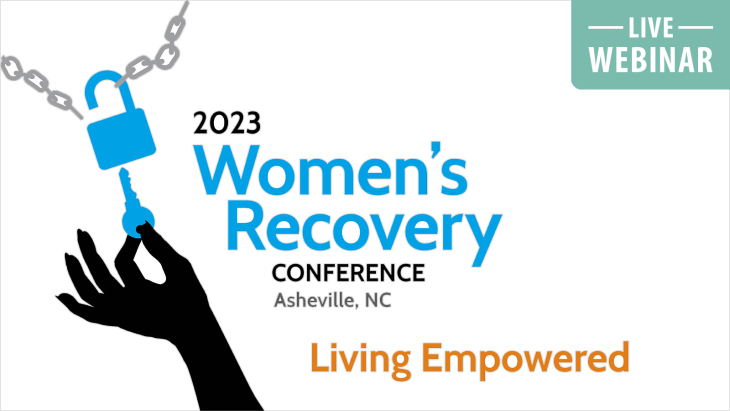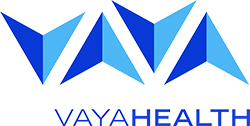2023 Women's Recovery Conference: Living Empowered
May 3–May 5, 2023 Closed Mental Health

Description
The conference has begun!
Online registration is no longer possible.
To register contact: Registration Team
This is the 37th year of the Women's Recovery Conference, where gender-specific care, focusing on the needs of women in recovery and their families, is exclusively presented. Up to 16.5 credit hours are offered, with a variety of credit options. The conference is designed for those working in substance abuse, mental health, psychology, criminal justice, human services, and other health care professions. Due to the current construction of a large parking deck at MAHEC, on-site parking is not available at this time. As a result, the 2023 conference will be held on a virtual platform over Webex, offered by Mountain Area Health Education Center (MAHEC) on May 3rd, 4th, and 5th of 2023.
One-day, two-day, and three-day options are available, with options for "Thursday Only" registration, "Friday Only" registration, or "Wednesday Preconference Only" registration. The event is designed with full livestream coverage and direct online access to presenters, allowing for the provision of mental health credits which are classified the same as "live." The livestream format also serves to assist practitioners who are unable to get away from their practice and who need to receive vital North Carolina updates to inform care.
Please click here for in-depth details about the 2023 Women's Recovery Conference.
The Preconference on Wednesday, May 3rd offers opportunities for both new and advanced practitioners.
Morning choices:
- Gender Specific Ethics – Bringing Clarity to the Beneficence vs. Autonomy Dilemma in Substance Use Treatment for Women
- Group Counseling & Group Community Building: Motivational Interviewing Focus
Afternoon choices:
- Clinical Supervision in Alcohol and Drug Counseling
- Beyond Competence: Aiming for Racial Humility
The 2023 Main Conference, on May 4th and 5th, opens at 9:00 am on Thursday, May 4th, with a compelling Keynote Speech by Kristie Puckett Williams, Deputy Director for Engagement and Mobilization with the North Carolina American Civil Liberties Union (ACLU), on "Dignity for Incarcerated Pregnant Women: The Impact of Race, Gender, and Substance Use Disorders on Incarceration."
The Main Conference features a variety of vital topics nestled into two parallel tracks, both following the opening keynote presentation.
Track One, on Thursday, May 4th, is a jam-packed 4.5-hour track inspired by DHHS MH/DD/SAS, with four separate, highly-relevant topics:
- Engaging Young Women (ages 18-25) in Substance Use Treatment & Recovery: Best Practices, Resources, and Interventions
- An Ongoing War on People: The Impact of Structural Racism on Pregnant and Parenting Women Experiencing Incarceration Due to Drug-Related Charges and Strategies to Lessen Those Harms
- Could it be Fetal Alcohol Spectrum Disorders? Strategies for Treatment Providers Working with Generation Z
- Giving a Voice to Child Welfare-Involved Women
Track Two on Thursday, May 4th, features three sessions:
- An Extraordinary Challenge: Eating Healthy on a Small Budget
- HIV/AIDS/STI/Hepatitis 101
- Project CARA's Hub and Spoke Network: Coordinating Regional Delivery of Perinatal Substance Use Care
Friday morning, May 5th, opens at 9:00 am with a formal North Carolina update by Starleen Scott-Robbins and Dr. Hendrée Jones, with everyone in attendance for presentations on:
- Update from the State: Women's SUD Treatment in North Carolina
- Hope, Resilience, Healing, and Health: Living Empowered
The conference ends with a choice of two concurrent sessions, designed to offer strategies that providers may immediately employ in their practices as they help women address health challenges and move forward on the path of empowerment, despite daily challenges:
- Nutritional Depletion in Addiction and Recovery: The Impact on Mental Health
- Acceptance and Commitment Therapy: Personal Perspective as the Key to Empowerment & Success!
Both of these sessions address strategies for offering uncompromised care for women in recovery, despite serious challenges. Participants may register for the session which best meets their service delivery needs.
Vital information for all providers working with women who are impacted by the opioid crisis is embedded within the entire three-day event.
A NOTE ON CREDITS
The 2023 Women's Recovery Conference offers up to 16.5 credit hours. *Please note that sessions will not be recorded, and live attendance is required to obtain credit. Gender Specific Ethics – Bringing Clarity to the Beneficence vs. Autonomy Dilemma in Substance Use Treatment for Women at the morning Preconference on Wednesday offers 3.00 hours of Ethics training if selected. For detailed information about NCASPPB credits, please click here.

Target Audience
Mental health and substance abuse professionals, including substance abuse counselors, psychologists, social workers, licensed clinical mental health counselors, marriage and family therapists, peer support specialists, nurses, school counselors, and other professionals interested in these subjects
Objectives
At the 2023 conference, session content supports the following overarching conference goals:
- Provide concrete information, therapeutic insights, and treatment skills which may be applied to process substance use and behavioral addictions
- Introduce group counseling and group community building skills to provide and ensure continuous, ethical care for women in recovery, within current workforce limitations
- Prepare providers with effective, evidence-based behavioral and nutritional interventions to help women enter recovery, prevent relapse through skill development, and sustain optimal health in long-term recovery, in benefit of women as well as their families
- Discuss legal strategies for closing major gaps in the current United States (US) care delivery system regarding treatment access for pregnant women, incarcerated women, and marginalized groups. Provide concrete examples of how drug policies and systemic racism have negatively impacted substance use treatment
- Detail ways in which systems can be trauma-informed and culturally-responsive to the needs of those with intersecting identities
- Inform providers of current legislation surrounding reporting on and care of pregnant women
- Articulate at least three evidence-based transformative modalities of care that foster social, psychological, and physiological well-being in women's recovery while reducing relapse risk and promoting harm reduction with concurrent medical and substance use diagnoses
- Describe at least three effective evidence-based strategies which meet the gender-specific needs of women with substance use disorders based on SAMHSA recommendations and/or those published in peer-reviewed journals within the past seven years
- Explain, in detail, the key components of at least three primary cutting-edge treatment approaches which foster resilience, build trust, and increase commitment to individualized therapeutic goals of women in recovery, while optimizing health outcomes
- Describe at least three evidence-based strategies which have been shown to foster the empowerment of women in recovery, helping them attain personalized goals in sustained recovery
- Demonstrate a commitment to honor diversity, celebrate individuality, promote authenticity, and foster genuine collaboration
- Provide current information on gender-specific ethics, infectious disease prevention, provider supervision, and optimization of nutrition in recovery
Faculty
- Debra K. Alvis, PhD, MMT, C-IAYT
- Rebekah Bass, BA
- Glenda S. Clare, PhD, LCAS, LCMHC
- Tammy J. Cody, MSW, LCSW
- Georganna Cogburn, MS, RD, LDN, IBCLC, RLC
- Jamia Davis, MSW, LCSWA, LCAS
- Essence N. Hairston, MSW
- Linda L. Hamilton, CADC
- Michael Harney, Jr., BA
- Amy C. Hendricks, BS
- Ron R. Hood, PhD, LP-HSP
- Hendre Jones, PhD
- Amy E. Marietta, MD, MPH, FAAFP, FASA
- Geri A. Miller, PhD, LP, LCAS, CCS
- Kristie E. Puckett-Williams, MA
- Allan W. Redash, MD
- Terri Redash, RN
- Starleen Scott-Robbins, MSW, LCSW
- Jordana Willers, EdM
Fees
$260.00
Early Registration Fee - PRECONFERENCE (Wednesday) + MAIN CONFERENCE (Thursday & Friday)
for students, peer support specialists and MAHEC employees(*Must provide proof of enrollment or peer support status)
$290.00
Early Registration Fee - MAIN CONFERENCE ONLY (Thursday & Friday)
$305.00
Registration Fee - MAIN CONFERENCE ONLY (Thursday & Friday)
$180.00
Early Registration Fee - MAIN CONFERENCE ONLY (Thursday & Friday)
for students, peer support specialists and MAHEC employees(*Must provide proof of enrollment or peer support status)
$195.00
Registration Fee - MAIN CONFERENCE ONLY (Thursday & Friday)
for students, peer support specialists and MAHEC employees(*Must provide proof of enrollment or peer support status)